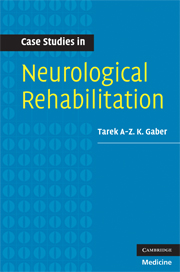Book contents
- Frontmatter
- Contents
- Preface
- Part I Clinical rehabilitation
- Part II Case studies
- 3 Medical issues in brain injury rehabilitation
- 4 Progressive neurological disorders
- 5 Medical complications of immobility
- 6 Orthotics in neurological rehabilitation
- 7 Ethical and medicolegal controversies
- 8 Chronic pain
- 9 Medically unexplained disorders
- 10 Spasticity management
- 11 Ventilatory support in rehabilitation
- 12 Sphincteric dysfunction
- 13 Communication disabilities
- 14 Sensory disability
- 15 Prescriptions for independence
- Part III Exercises in neurological rehabilitation
- Index
4 - Progressive neurological disorders
from Part II - Case studies
Published online by Cambridge University Press: 13 August 2009
- Frontmatter
- Contents
- Preface
- Part I Clinical rehabilitation
- Part II Case studies
- 3 Medical issues in brain injury rehabilitation
- 4 Progressive neurological disorders
- 5 Medical complications of immobility
- 6 Orthotics in neurological rehabilitation
- 7 Ethical and medicolegal controversies
- 8 Chronic pain
- 9 Medically unexplained disorders
- 10 Spasticity management
- 11 Ventilatory support in rehabilitation
- 12 Sphincteric dysfunction
- 13 Communication disabilities
- 14 Sensory disability
- 15 Prescriptions for independence
- Part III Exercises in neurological rehabilitation
- Index
Summary
During an annual, routine medical review for a patient with a progressive neurological condition such as multiple sclerosis or Parkinson's disease, it is not unusual to hear the patient saying ‘what I really need doctor is more physiotherapy’. A referral for further physiotherapy is often made.
It is very difficult to propose the perfect model of service for patients withneurological progressive disorders. However, regular reviews can hardly meet the patient's needs. In my view, what the patient needs is an assessment followed by a prompt intervention to address his/her problem. The expertise and interests of a patient's GP vary greatly and some would prefer to delegate responsibility to a more specialist service. The popularity of specialist nurses is self-evident and they often fulfil their role as a first contact efficiently. They should be able to channel the patient to the appropriate service whether it is for therapy assessment or for medical, nutritional or social review.
One of the shortcomings of this model is the relative lack of experience of the specialist nurses regarding the different roles of all the professionals that can potentially help the patient. Therefore, many inappropriate referrals can be made, creating a huge caseload on popular disciplines such as physiotherapy.
The first contact of the patient should be someone who has the necessary skills to assess the patient fully, the authority to make the necessary referrals and the ability to act as a gatekeeper for other services.
- Type
- Chapter
- Information
- Case Studies in Neurological Rehabilitation , pp. 44 - 56Publisher: Cambridge University PressPrint publication year: 2008



